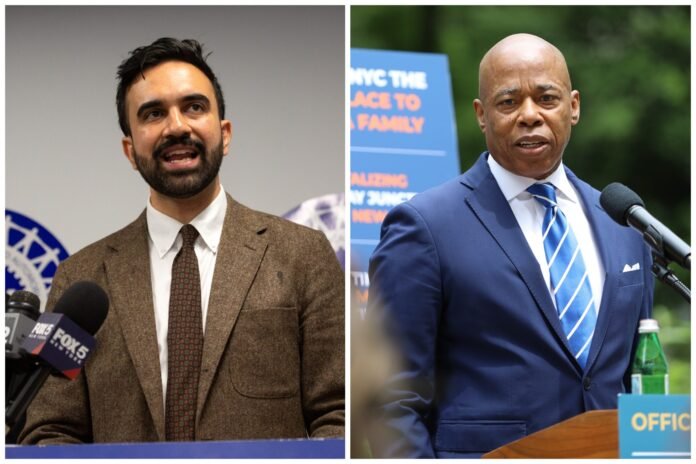The unexpected victory of democratic socialist Zohran Mamdani as the presumed Democratic nominee for mayor confronts business leaders with a dilemma: Build bridges to a candidate they bitterly opposed as too far left or get behind Mayor Eric Adams bid for reelection.
All signs point to the Adams option, as the incumbent mayor launches his campaign as an independent after dropping his bid for the Democratic nomination.
The day after this week’s primary election, leading real estate executive Scott Rechler said he would support Adams despite the many scandals that have engulfed the mayor.
“You want to have leadership that speaks to what New York is,” Rechler said. “It’s the capital of capitalism.”
Another key business leader, who asked not to be named, put it more bluntly: “What do we have to lose?”
This is not the outcome the executives had expected. They had generally abandoned Adams as he had become snared in scandals and coalesced behind former Gov. Andrew Cuomo, whose independent super PAC Fix The City received millions of dollars from them. Rechler, a longtime friend and informal advisor to Cuomo, gave $250,000 to the PAC. Former Mayor Michael Bloomberg donated a little more than $8 million.
The problem for business leaders is twofold. Unlike progressives like Comptroller Brad Lander, they don’t know Mamdani and have no links to him. More importantly, his policies, especially calling for a four-year rent freeze on regulated apartments and an increase in taxes on both corporations and wealthy New Yorkers, are anathema to them.
“Mamdani’s past comments and campaign rhetoric raise serious concerns in the city’s business community,” said Kathy Wylde, CEO of the Partnership for New York City, which represents large companies. “Most do not know him, but fear he is not well informed on the fiscal and economic challenges facing our city.”
Real estate interests make the same argument.
“Based on candidates’ campaign platforms, in November voters will need to choose between practical or fanciful and extreme ways to continue the drop in crime, build much necessary housing and create good jobs,” said James Whelan, president of the Real Estate Board of New York, in a statement.
Wylde and Whelan represent the city’s business establishment. The billionaires like Bill Ackman who have ridiculed Mamdani on social media are not part of the group. But they have the ability to pour untold millions into the November election if they want, which is what Ackman said Thursday he would do if he were convinced there was a viable candidate to oppose Mamdani.
“New York City under Mamdani is about to become much more dangerous and economically unviable,” the Pershing Square CEO posted to social media on Wednesday.
The mayor could also expect large donations from crypto executives, who were among the biggest contributors to 2024 campaigns and whose interests the mayor has been trumpeting even before his election.
In one sign of the uncertainty gripping business leaders, none of the local chambers of commerce responded to a request from THE CITY on their reaction to the election.
One possibility is that executives could use allies of Mamdani as a way to connect, says Suri Kasirer, one of the most important lobbyists for business interests.
“People like Brad Lander are going to be very important in building bridges,” she said. “And lots of people in the business community have a relationship with Brad.”
She also believes executives could seek to influence the election of a speaker of the City Council who would be more in line with their views and could serve as a check on Mamdani were he to win.
While Mamdani pledged to reach out to Jewish groups worried about his stance on Israel, no similar initiative appears to have been undertaken with business leaders. The campaign did not return a request for comment on business outreach.
Wylde convened a call Wednesday afternoon with business leaders to assess the results.
“We discussed the situation and the options for the general election and agreed to see what happens in the coming days,” she said.






